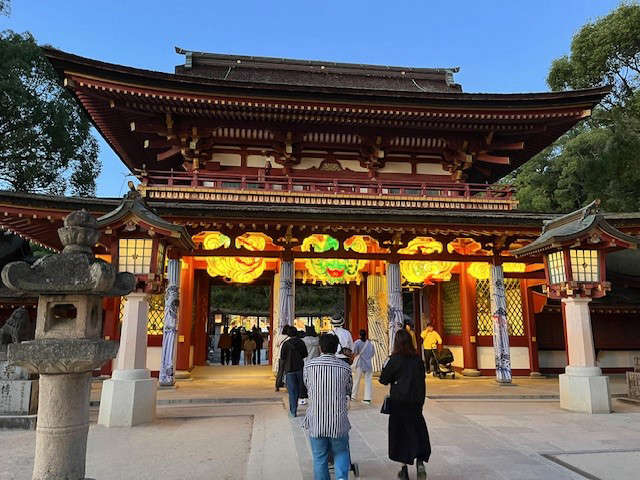
And we have yet another national holiday related column this week.
As regular readers have surmised over the past several months, Japan has many national holidays, and November is blessed with two of the 16 annually celebrated holidays.
Labor Thanksgiving Day (or “Kinro Kansha no Hi) is celebrated every Nov. 23 and it observes paying respect to all those who work hard to do their jobs well. It is meant as a day of rest for workers and it gives laborers an opportunity to reflect inwardly on their work lives, allowing everyone to be thankful for all they have been afforded through their jobs and work-related activities.
The “Thanksgiving” portion of the holiday has its origin dating back to around 660 B.C., which focused on a harvest festival. In 1948, when the Japanese government adopted the “national holiday law” that formally recognized many of the holidays, while combining others, this holiday officially became “Labor Thanksgiving Day.”
During the Occupation, the U.S. officials pressured Japan to give up its purely religious holidays by renaming them and making them more secular in scope. The Labor Thanksgiving holiday is a good example of this effort.
I am often asked back home if Japan celebrates “Thanksgiving” and technically, yes it does … but it is nothing like an American Thanksgiving. After all, Japan had no pilgrims or Native Americans in their history, so there is no reason here to celebrate an American-style Thanksgiving. Many Japanese families will take it easy on this day and will have a special meal of fish, rice, seaweed salad, topped off with Japanese tea, but there is no set menu like is the tradition in the U.S. for our Thanksgiving celebration.
However, because Nov. 23 falls around the same time that Americans do celebrate a traditional Thanksgiving, over the years I have been a part of Thanksgiving feasts that we expatriate Americans organize and host for ourselves to give us a taste of home. Thirty years ago, it was nearly impossible to find a turkey, and when we did, finding an oven big enough to cook it in was difficult.

A fond memory I have of one of my first American-style Thanksgivings in Japan was in 1990. A Canadian teacher invited all of the Assistant Language Teachers (ALTs) on the Japan Exchange and Teaching (JET) Program in Aomori Prefecture to come to his junior high school to partake in a traditional American Thanksgiving meal.
We all brought side dishes, invited our Japanese co-workers to dine with us, and we all celebrated Thanksgiving together. The school where the Canadian teacher taught English had a really nice home economics room where we could cook and prepare the meal … and it had a big enough oven to cook the turkey that we ordered at great expense from Tokyo for the celebration.
Most of us had been in Japan for well over a year, so having authentic Thanksgiving holiday dishes tasted so good. I think I made deviled eggs to take and share with everyone.
As well, many Japanese workers will observe May 1 as a type of Labor Day, with many trade unions holding rallies or marches on this day, just like in other parts of the world, but it is not a “national” or official holiday like the Labor Thanksgiving Day is on Nov. 23. One reason may be that there are already a number of national holidays in late April and early May that Japan observes, so there is no need to add May 1 as a national holiday since workers are celebrated on Nov. 23 every year.
During the month of November, I will often see artwork or cards prepared by school children displayed in public spaces, like train stations, around this time of the year. The children either write encouraging messages to workers, thanking them for their hard work, or draw pictures of various workers performing tasks related to their jobs. This is a way for the children to show their appreciation to all those who work to make society function smoothly and efficiently.
Many companies and offices will recognize outstanding workers during this holiday to congratulate them on a job well done, and to thank them for their dedication to their workplace. If the holiday happens to fall on a Sunday, then usually the Monday is the national holiday. This year the 23rd is on a Saturday, so technically it is not a day off as many people work at least part of the day on Saturdays, so the holiday is observed for those who would normally work on the Saturday.
Many Japanese holidays and celebrations followed the lunar calendar, but in 1873 when the Gregorian calendar was officially adopted, most of the holidays then were set on specific days. The religious based Shinto and Buddhist holidays were adapted and combined into secular holidays, for the most part, as is evident with the Labor Thanksgiving Day that combined the traditional harvest festival of Niinamae-sai that was Shintoist in origin with a more modern concept of recognizing laborers on this same day.
Many Japanese workers will visit a Shinto shrine as a family outing on the Labor Thanksgiving Holiday in Japan. It offers people a chance to give thanks for having work and to thank the gods for providing for the family. Just like in Christian countries, people who feel blessed want to express their thanks and appreciation to a higher power.






